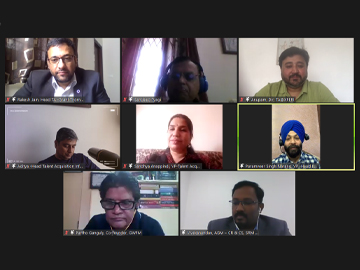Young researcher presents research paper amidst scholars at global conference – ICCCS 2020
Nikhila Korivi offers revolutionary approach to ensure Data Security
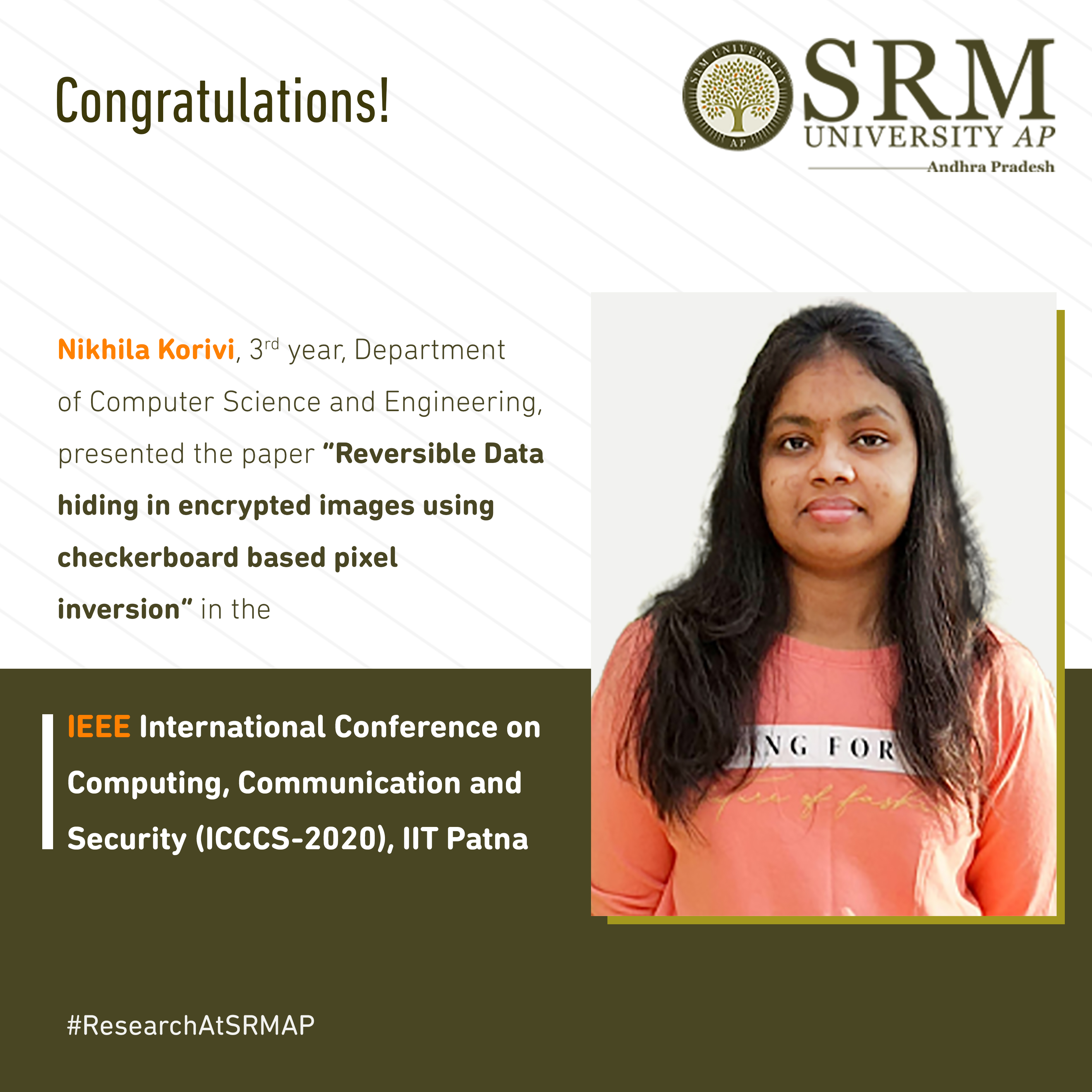 Nikhila Korivi, third year, Department of Computer Science and Engineering, SRM University- AP, Andhra Pradesh was steered by Dr Manikandan V M, Assistant Professor, Department of CSE, to present the pioneering research paper “Reversible Data hiding in encrypted images using checkerboard based pixel inversion” in the IEEE International Conference on Computing, Communication and Security (ICCCS-2020), IIT Patna, held on October 14-16, 2020.
Nikhila Korivi, third year, Department of Computer Science and Engineering, SRM University- AP, Andhra Pradesh was steered by Dr Manikandan V M, Assistant Professor, Department of CSE, to present the pioneering research paper “Reversible Data hiding in encrypted images using checkerboard based pixel inversion” in the IEEE International Conference on Computing, Communication and Security (ICCCS-2020), IIT Patna, held on October 14-16, 2020.
Nikhila and her mentor, Dr Manikandan V M, worked on the paper conjointly for which, she is profoundly grateful to the professor. She says, “I thank Dr Manikandan and my other professors at SRM University-AP for their continuedguidance that inspired me to do research. Their encouragement propelled me to successfully present the research paper at ICCCS-2020, a conference revered by the entire scientific community.”
Nikhila has been keen on exploring and broadening her horizon of knowledge. Right from her early undergraduate days, Nikhila was intrigued by Information Security, an emerging discipline in the modern era. Soon she recognized that Reversible Data Hiding is an active research area in the realm of Information Security, which has extensive application in Medical Image Transmission, and Cloud Computing.
On approaching her professor, Dr Manikandan enthused Nikhila to embark on the research work and propose a new Reversible Data Hiding scheme in encrypted images by using a checkerboard pattern-based pixel inversion technique. Nikhila informs, “The proposed scheme ensures a better bit error rate without compromising on the embedding rate. The algorithms were implemented using Matlab-2019 and the experimental studies of the proposed scheme have been carried out using a standard image dataset (USC-SIPI) managed by the University of Southern California.”
This revolutionary approach is immensely beneficial when it comes to Data Security, and it is widely implemented in medical image transmission along with many other sectors. Fostering her interest in pursuing research and advanced studies, Nikhila plans to enhance her research work by focusing on designing and developing new Reversible Data Hiding schemes with better embedding rates without compromising other efficiency parameters such as computational complexity, robustness, and bit error rate.
- Published in CSE NEWS, News, Research News
ECE Undergrads developed AI-based communication app for deaf and blind
Won prestigious i-Hack Alpha with a cash prize of $2300
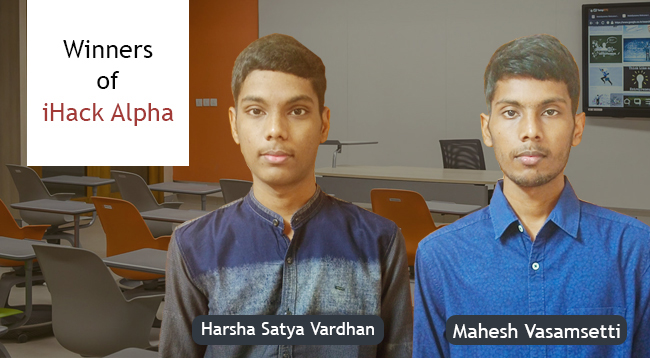 Department of Electronics and Communication Engineering rejoices in the exhilarating success of Harsha and Mahesh, the winners at iHack Alpha Hackathon. iHack Alpha was an AI-Hackathon, where developers from all backgrounds were invited to solve real-world problems with innovative AI solutions powered by sentient.io AI and Data platform. Unlike the usual hackathons, it was conducted over three weeks, starting from December 2, 2020, and finished on December 27, 2020, and participants were supposed to present a full-fledged application. Four themes were given to participants to work on in the hackathon- 1) Use of AI in retail 2) Use of AI in Customer service 3) Use of AI in media 4) Use of AI in Accessibility.
Department of Electronics and Communication Engineering rejoices in the exhilarating success of Harsha and Mahesh, the winners at iHack Alpha Hackathon. iHack Alpha was an AI-Hackathon, where developers from all backgrounds were invited to solve real-world problems with innovative AI solutions powered by sentient.io AI and Data platform. Unlike the usual hackathons, it was conducted over three weeks, starting from December 2, 2020, and finished on December 27, 2020, and participants were supposed to present a full-fledged application. Four themes were given to participants to work on in the hackathon- 1) Use of AI in retail 2) Use of AI in Customer service 3) Use of AI in media 4) Use of AI in Accessibility.
Harsha and Mahesh chose to work on the use of AI in the Accessibility theme, where they were asked to build an AI – solution using the sentient.io services. The whole hackathon was divided into three phases 1.) Ideation Phase 2) Build Phase 3) Finals.
Around 1083 teams participated across countries such as India, Malaysia, the Philippines, Indonesia, and Singapore.
Harsha and Mahesh found their inspiration in the story of Helen Keller and decided to build an app with ease of accessibility for the blind and deaf persons. As Annie Sullivan used to help Helen in her communication, Harsha and Mahesh thought, why can’t they create an app which can be installed on the mobile phone and will do the same! The duo turned this crazy idea into reality by developing Artificial Voice- a communication app for the blind and deaf. Artificial Voice is a bidirectional communication app for the deaf and blind to send and receive messages with the help of AI-based technology such as Automatic Speech recognition, Text to speech converter, Audio format converter.
The whole Hackathon was broadcasted online. Harsha and Mahesh’s presentation on Artificial Voice received high praise and acclaims from the judges, and the Team SRMAP(aka Team Square) secured first place in the prestigious i-Hack Alpha hackathon with a grand cash prize of $2300. Harsha is currently pursuing his 3rd year B. Tech Studies whereas Mahesh is in the 2nd year of his undergraduate studies at the Department of Electronics and Communications Engineering. “This success at i-Hack Alpha hackathon has boosted our confidence. We are working on better versions of the app and some other projects that can contribute to society,” said Harsha.
- Published in Departmental News, ECE NEWS, News, Students Achievements
SRM University-AP and GWFM organised National Human Resource Conclave-2021
SRM University-AP organised the grandest National HR Conclave-2021, the grandest conglomerate of Human Resource experts, on February 27, 2021, in association with the Global Workforce Management Forum. The theme of the conclave for this year was “Leading the Disruption- The HR Agenda for 2021 “. Senior Human Resource Leaders from reputed companies such as KPMG, Airbus, IBM, Informatica, Standard Chartered Bank, Flipkart, Shriram Bio-seeds, NCC Ltd, NOKIA, Infosys BPO, Volvo Group, Reliance Jio, Western Digital, Visa, Accenture, Grant Thornton LLP, Xperi Corp, Western Digital, Kromozones Software Pvt. Ltd, Shriram Bioseeds, SS&C Technologies delivered keynote speeches and participated in Panel Discussions in the daylong event.
The event was started with the opening remarks of Prof V S Rao, Vice-Chancellor, SRM University-AP. In his speech, Prof Rao explained briefly how disruptive innovation had benefitted several industries such as the telecom and communication industry, automobile industry and others so far. It is high time to explore the opportunities in the Human Resource sector. “Covid-19 has provided us with many opportunities. Post-COVID era is the era of changed perspective and innovation, enabling the commoners to reap the benefits of technology,” said Prof Rao. He also stated the University encourages students to make use of the opportunities such as undergrad research, semester abroad program, student run-tech labs, etc to enhance their creative and innovative thinking.
Advancing the proceedings of the event, the founders of GWFM gave a brief understanding of their organisational structure and operations. Global Workforce Management Forum, founded in June 2014 by Dr Shiva Kumar and Partho Ganguly, is the world’s first WFM Forum. It is a non-profit professional organisation comprising of a group of Senior WFM & HR professionals committed to promoting the WFM movement on the global platform. Mr Ganguly set the tone for the conclave by addressing the present stagnation in Human Resource and opportunities to move forward.
In the first Keynote speech of the conclave Mr Unmesh Pawar, Partner – People Performance & Culture- KPMG India, explained how workforce reshaping is going to be a key element as we move forward. COVID-19 has changed the HR perspective globally. Mr Pawar took some realistic examples from whatever is happening worldwide and how it is creating shifts in overall organisational behaviour and operations.
The event progressed with a few panel discussions. Commenting on the importance of Digital, Data and Disruptions, the panel agreed that data analytics is crucial in today’s world, where we are standing on the verge of digital transformation. Predictive data analysis is being used to make business decisions. It is very important to have a sharp and clear objective to move forward in this field with countless opportunities.
Advancing into the event, Mr Suraj Chetri, Director HR Airbus India illuminated the audience with his strategic keynote on The Future of HR. “Start-ups are the future. Larger conglomerates will break into smaller companies with the abolishment of hierarchy. A lot of focus will be in healthcare and safety with special emphasis on mental health,” said Mr Chetri. According to him, a smart workplace is going a play a major role in the future. Technology will support employees to carry out several activities in a seamless way. It is going to impact the workplace culture and office management. Machine learning, data-driven automation, physical as well as virtual connectivity and Team collaborations are going to sustain in the future.
In another discussion on HR strategies to build flexibility, adaptability, and agility, the panel agreed on that every crisis goes through a time of recovery. This is a recovery phase. What is needed is adaptability as a skill. People are now looking for adaptability as the most important tool and hiring criteria. There are many tools and technologies to aid the recruitment process. But that is for ease of administration. More important is how one positions himself? Students should be focused from the beginning to create their own brand, deciding their selling points and USPs.
While speaking on the Future-proofing workforce 2020: Upskilling employees for future-oriented career trajectories, Mr Augustus Azariah, Human Resource Leader IBM mentioned that organisations used to build skills, capabilities, competencies, risk appetite among the employees. These skills are now being used to stay afloat in the storm called COVID-19. Analytics says storm riders are highly adaptable, willing to take risks with the resilience to get teams together. “If we walk through a journey of how HR has evolved over the years, we will find that it used to be process-driven, but now it is experiential and result- oriented. Conversion of data into actionable insights, design thinking, awareness of market trends, proactive learning and upskilling are the tools that employees of the future will need. To be an essential part of the future, one has to be digitally aware with a work experience consistent with his customers’ experience along with proper sensitisation in the workplace with the changed demographics,” advised Mr Azariah.
Over 25 Human Resource experts joined the conclave to share their view and usher in the way forward for the students. the conclave provided food for thought for the fellow recruiters as well as the students were highly motivated to listen to the experts speaking on real time problems with a solution. Mr Vivekanandan, Assistant Director-CR&CS, SRM University-AP, cordially thanked all the speakers, panel members, and the GWFM for their efforts to make the conclave a grand success.
- Published in CR&CS, CR&CS NEWS, CR&CS Webinars, News
Dr Nimai Mishra analyze approaches to Amine-Free Synthesis of Colloidal Cesium Lead Halide Perovskite Nanocrystals
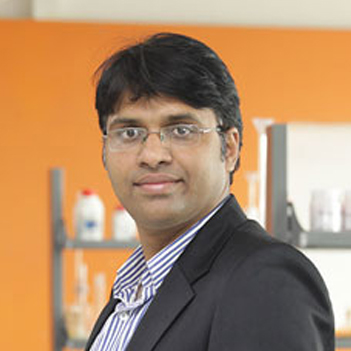 Dr Nimai Mishra, Assistant Professor, Department of Chemistry, SRM University-AP, Andhra Pradesh, accompanied by his research group encompassing students pursuing PhD under him, Mr. Syed Akhil and Ms. V.G.Vasavi Dutt have published a comprehensive mini-review titled “Amine-Free Synthesis of Colloidal Cesium Lead Halide Perovskite Nanocrystals” in the Journal “ChemNanoMat” (Wiley-VCH) with an Impact Factor of 3.4.
Dr Nimai Mishra, Assistant Professor, Department of Chemistry, SRM University-AP, Andhra Pradesh, accompanied by his research group encompassing students pursuing PhD under him, Mr. Syed Akhil and Ms. V.G.Vasavi Dutt have published a comprehensive mini-review titled “Amine-Free Synthesis of Colloidal Cesium Lead Halide Perovskite Nanocrystals” in the Journal “ChemNanoMat” (Wiley-VCH) with an Impact Factor of 3.4.
Colloidal cesium lead halide (CsPbX3) perovskite nanocrystals (PNCs) are emerging disciplines in research aided by their exceptional optical properties and remarkable colour tunability. Oleic acid and oleylamine are the frequently used surface capping ligands in colloidal CsPbX3 synthesis. The oleylamine plays an important role in surface passivation and maintaining colloidal stability. However, in the long run, it is accountable for poor colloidal stability because of the facile proton exchange. This heralds to the formation of labile oleylammonium halide, which removes the halide ions from the Nanocrystals’ surface.
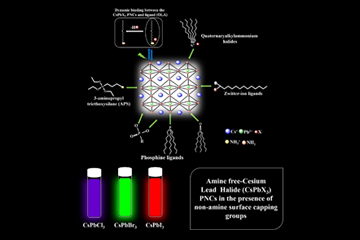 Leveraging on the synthetic toolboxes developed from decades of research into more traditional semiconductor nanocrystals, lately, researchers are focusing on creating various amine‐free synthesis approaches to improve the colloidal and photostability of CsPbX3 perovskite NCs. In this paper, Dr Mishra and his team encapsulated various amine‐free based synthetic routes of CsPbX3 (X=Cl, Br, I) PNCs that have been reported so far. They reviewed this progress in terms of their underlying synthetic approaches, and post‐synthetic treatment steps.
Leveraging on the synthetic toolboxes developed from decades of research into more traditional semiconductor nanocrystals, lately, researchers are focusing on creating various amine‐free synthesis approaches to improve the colloidal and photostability of CsPbX3 perovskite NCs. In this paper, Dr Mishra and his team encapsulated various amine‐free based synthetic routes of CsPbX3 (X=Cl, Br, I) PNCs that have been reported so far. They reviewed this progress in terms of their underlying synthetic approaches, and post‐synthetic treatment steps.
Furthermore, Dr Mishra and his group analyzed the prospects of these perovskite nanocrystals in terms of their photo‐luminescence properties and device performances. Advancing, a deeper understanding of the role of precursors and ligands will significantly bolster the versatility of these amine‐free PNC materials.
To read the full paper: Please Click Here
- Published in News, Research News


